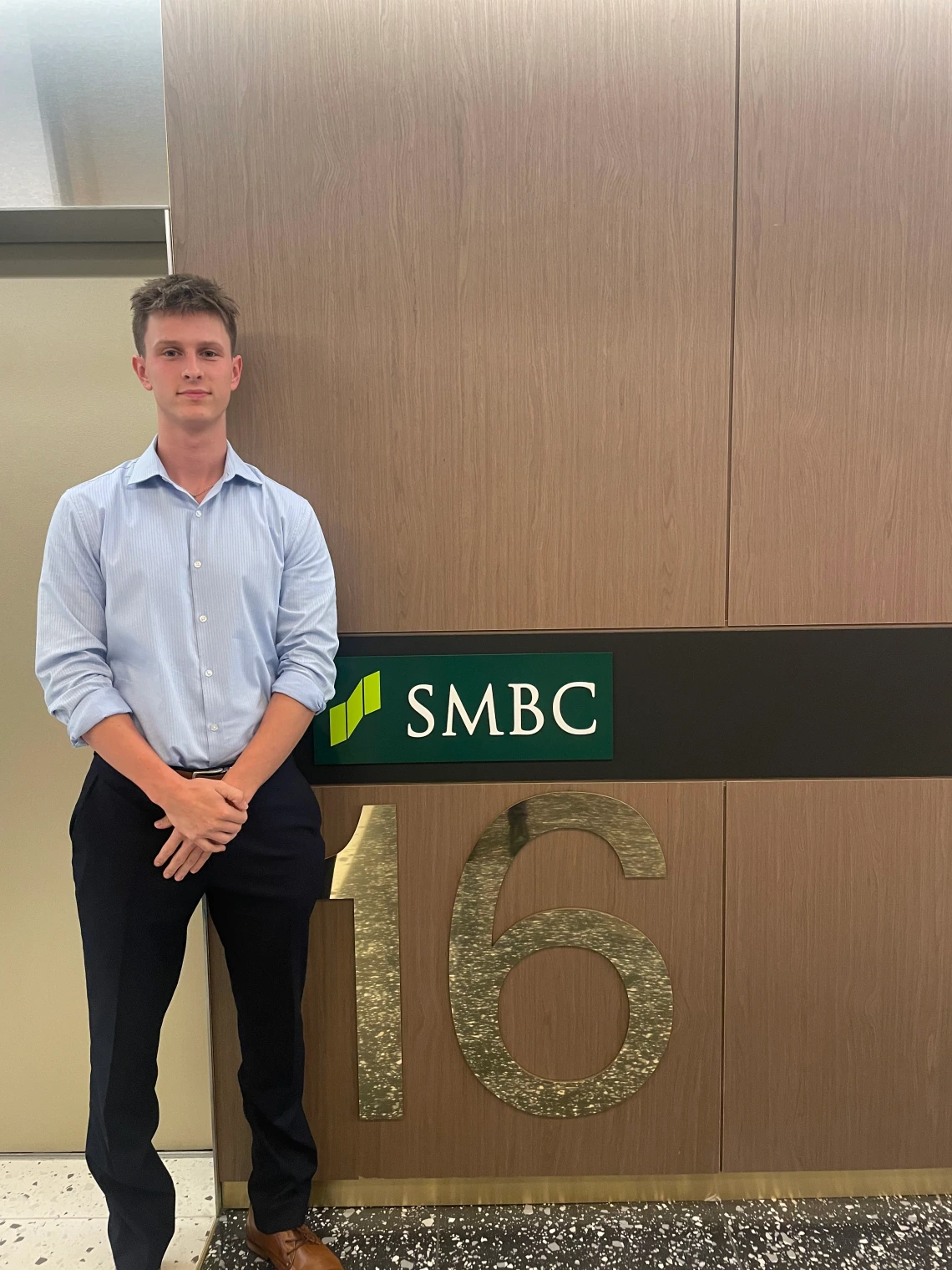Justin Brown '26 Banking Summer Analyst
Banking Summer Analyst at Sumitomo Mitsui Banking Corporation

Justin Brown '26 (BSBA Finance) was a Banking Summer Analyst at Sumitomo Mitsui Banking Corporation in New York, New York.
What was the process of getting this internship?
Landing this internship was a process that really tested persistence. Breaking into banking and high finance is incredibly competitive, so getting used to hearing “no” and not giving up is incredibly valuable. I spent a few months sending out hundreds of cold emails and LinkedIn messages, trying to connect with anyone willing to chat. Since banking is such a relationship-driven industry, my focus was on building and maintaining those connections in hopes of somehow getting my foot in the door or a getting a referral.
From there, I focused on refining my resume and make it as good as possible before applications opened. Once they did, I made it a daily routine to apply. I probably submitted over 100 applications throughout the process. If I was fortunate enough to get an interview, I made sure to be prepared. That meant researching each bank thoroughly, fine tuning technical skills, and having structured, thoughtful answers ready.
If you are working on a big project, please describe it:
Me and a group of 3 other people have been assigned to do a case study on a very broad topic of the future of the bank. It is something we will be presenting in front of senior management, so is very important to make it something that can realistically be implicated along with aligning with the bank’s goals. My team and I have come up with a few different proposed solutions on how to implement AI (RPA) within the bank, so we become more efficient and deploy more of our balance sheet into profitable investments. I have been making and refining a few different models over the course of a couple weeks simulating a hypothetical acquisition of an AI company that competitors such as JPM and Citi currently use. The most challenging part is making sure I have accurate assumptions and ensuring the cost synergies we would realize are realistic. It’s involved setting up meetings across various teams to obtain accurate inputs I can use.
I’m currently working with a team of three others on a strategic case study which we’ll be presenting to senior management. The goal is to propose a realistic and actionable solution that aligns with the bank’s long-term objectives.
Our focus has been on how to implement AI, specifically robotic process automation (RPA), to drive greater operational efficiency and free up more of the balance sheet for high-return investments. I’ve been developing and refining several financial models simulating a hypothetical acquisition of an AI firm currently used by peers like JPMorgan and Citi. The most challenging part has been ensuring our assumptions are sound and that the projected cost synergies are realistic and justifiable.
I’ve been coordinating with various internal teams to gather accurate inputs and stress-test our assumptions. It’s been a complex but rewarding process, one that mirrors the collaboration that defines real-world banking.
What advice to I have for students with similar interests?
If you're looking to break into banking or any high finance role, my biggest piece of advice is to start as early as possible. I personally got a later start because I didn’t fully realize this was the path I wanted until just a couple months before recruiting began, which definitely put me at a disadvantage. A lot of people begin preparing for junior year internships as early as freshman year. While I don’t think it’s realistic to expect people to know what they want that early, starting even a little bit sooner can go a long way.
If you can get an internship in a related field the summer before or even just begin exploring technical materials and the recruiting process, it’ll make a huge difference. Aside from that, networking is everything. It’s easy to overlook it due to often that gets said, but once you’re actually in the process, it becomes pretty apparent as to why it is being said. After your first job, jobs in finance don’t typically come from applying through handshake or filling out applications. They are usually going to be offered to you through that network of people you’ve built up over time.
How did Eller prepare you for this?
Eller has played a major role in preparing me not just to succeed in this internship, but also to secure it in the first place. The staff at Eller were incredibly supportive across different verticals of the process, whether it was refining my resume, preparing for interviews, or simply helping me navigate the nuances of such a competitive industry. As someone who initially didn’t know much about what breaking into high finance required, the support I received was truly helpful.
Once I started the internship, I realized how much my Eller classes had prepared me. Skills like professional communication and have been directly applicable. Honestly, I’ve found myself using concepts I didn’t think I’d ever use from classes I never thought would apply to me.

